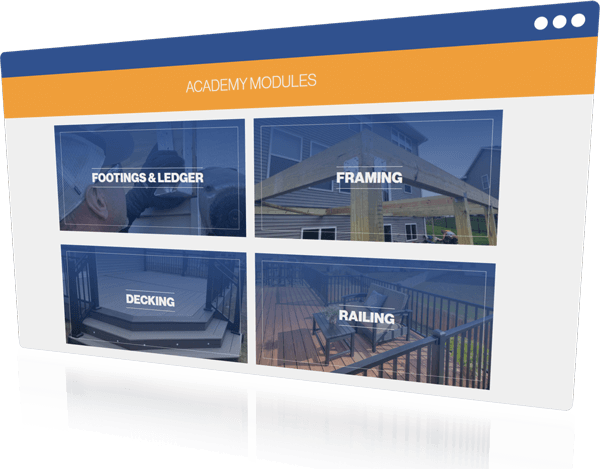The Perils of Using Deck Blocks

Building a deck can transform your outdoor space into a haven for relaxation and entertainment. However, choosing the right foundation is crucial to ensure its longevity and safety. One common option that DIY enthusiasts and even some professionals consider is deck blocks. While they might seem like a convenient solution, there are significant perils associated with their use, especially when supporting structures like 6×6 posts. In this article, we’ll delve into the potential pitfalls of using deck blocks and explore better alternatives for your decking project.
What Are Deck Blocks?
Deck blocks, also known as pier blocks, are precast concrete blocks designed to provide a simple base for decks. They eliminate the need for digging holes and pouring concrete footings. Essentially, deck blocks are set directly on the ground, and the deck’s posts rest on top of them. This method is often advertised as a quicker and more affordable option compared to traditional footings.
The Appeal of Deck Blocks
For many, the appeal of deck blocks lies in their simplicity. They are readily available at most home improvement stores and don’t require specialized skills or heavy equipment to install. This makes them a popular choice among DIYers looking to save time and money on their deck projects.
The Risks of Using Deck Blocks
Despite their allure, deck blocks come with several risks that can compromise the integrity and safety of your deck.
Stability Issues
One of the most significant concerns with deck blocks is stability. Since they sit directly on the ground, they are susceptible to shifting due to soil movement, freeze-thaw cycles, and erosion. This can lead to an uneven deck surface, structural weaknesses, and, in the worst cases, collapse.
Weight Limitations
Deck blocks are not designed to support heavy loads. When used with larger posts like 6×6, they may not provide adequate support, increasing the risk of structural failure. This is especially concerning if your deck will accommodate heavy items like hot tubs or large groups of people.
Code Compliance
Many local building codes have specific requirements for deck foundations. Deck blocks may not meet these regulations, leading to potential legal and safety issues. Ensuring compliance with local codes is crucial to avoid fines and ensure the safety of your deck.
Alternatives to Deck Blocks
Fortunately, there are safer and more reliable alternatives to using deck blocks, each offering greater stability and support.
Concrete Footings
Concrete footings are the traditional choice for deck foundations. Although they require more effort and resources to install, they provide a stable, durable base that can support heavy loads. By digging holes below the frost line and filling them with concrete, you create a solid footing that minimizes the risk of shifting and settling.
Helical Piers
Helical piers are an innovative alternative that offers the benefits of concrete footings with easier installation. These screw-like steel rods are driven into the ground, providing strong support without the need for extensive digging. They are especially useful in areas with difficult soil conditions.
Diamond Pier Foundation System
The Diamond Pier system is another modern solution that combines ease of installation with robust support. It involves driving pre-cast concrete piers into the ground with steel pins, creating a stable foundation without extensive excavation. This system is designed to withstand soil movement and freeze-thaw cycles.
Real-Life Examples of Deck Block Failures
Consider the case of a homeowner who opted for deck blocks to support their new deck. Initially, the deck looked great, but after a few seasons, it began to sag and shift. Upon inspection, it was discovered that soil erosion and freeze-thaw cycles had caused the deck blocks to move, leading to structural instability. The homeowner had to invest in costly repairs to replace the deck blocks with concrete footings.
The Cost of Cutting Corners
While deck blocks might seem like a cost-effective option upfront, the potential for failure can lead to expensive repairs and replacements. Investing in a more reliable foundation from the start can save you money and stress in the long run.
Ensuring a Successful Deck Project
To ensure the success of your deck project, consider the following tips:
Plan Thoroughly
Before starting your project, take the time to plan carefully. Consider the size, weight, and intended use of your deck. Consult local building codes to ensure compliance and obtain any necessary permits.
Choose the Right Foundation
Select a foundation method that suits your deck’s requirements and your local soil conditions. While deck blocks may seem appealing, investing in a more stable foundation like concrete footings or helical piers will pay off in the long run.
Seek Professional Advice
If you’re unsure about the best foundation for your deck, consult with a professional. They can assess your specific situation and recommend the most suitable option. Their expertise can help you avoid costly mistakes and ensure a safe, durable deck.
Consider Hiring UglyDeck.com to Install Your Footings For You
UglyDeck.com has a footing and ledger installation service for customers who purchase their materials from an UGlyDeck.com location, including Shakopee, MN and Glendale Heights, IL. This option gives the DIY homeowner the assurance that their foundation is installed correctly, and offers a huge savings for the overall project.
Learn more about our DIY Assist Program here.
Conclusion
While deck blocks might seem like a convenient solution for your deck project, the potential risks far outweigh the benefits. Stability issues, weight limitations, and code compliance challenges make them a less-than-ideal choice, especially for supporting larger structures like 6×6 posts. By opting for more reliable foundation methods like concrete footings, helical piers, or the Diamond Pier system, you can ensure the safety and longevity of your deck. So, before you embark on your next deck-building adventure, consider the long-term implications and make an informed choice that will enhance your outdoor living space for years to come.

Skip Big Box! and DIY with UglyDeck.com!
Save thousands and DIY your deck with the help of a free coach who knows your project, plus videos, pictures and step-by-step instructions from our DIY Academy. Every DIY Deck Package also comes with free permit drawings and free local delivery.
Learn More

Find Out What
Your Project
Will Cost
Use our easy estimator tool to pick materials, explore options, and find out what your DIY deck project will cost!
Start Your Estimate



